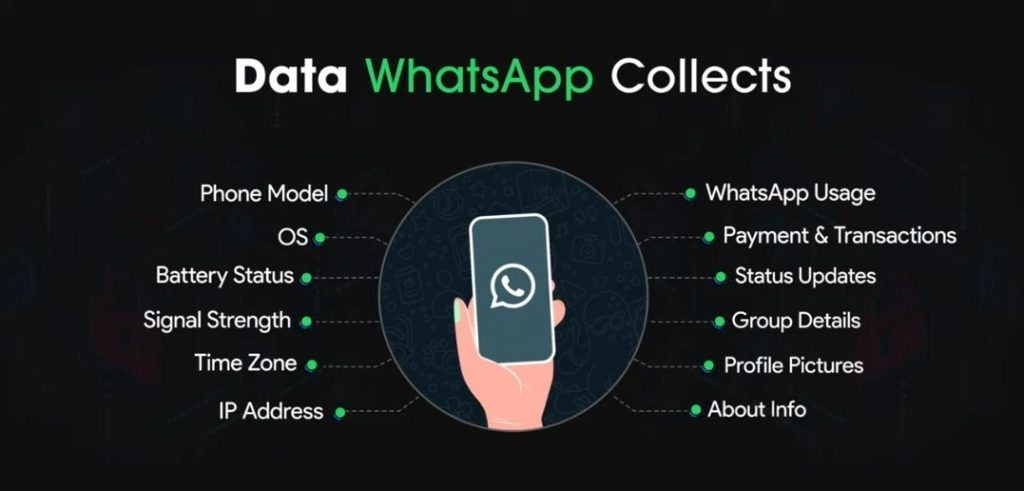Latest News
Users Flock To Signal Messaging App After Whatsapp’s Latest Privacy Policy Update

If you own a smartphone, there is a very high chance that you are a WhatsApp user. The simple and lightweight online messaging application has embedded itself into our lives and has become indispensable. Family groups, friend groups, office groups, play groups and many other groups like these see millions of conversations happening on a daily basis. Millions of people across the world use Whatsapp for multiple purposes. Beginning from a simple user to user online text messaging app, over the years Whatsapp has grown exponentially by adding a lot of features like payments, location sharing, pictures and video sharing, document sharing, group chats and calls.
Whatsapp users received a message upon opening the app on their phone which conveyed information regarding a privacy policy update. The notification carried information regarding how Whatsapp processes user data and how Whatsapp partners with Facebook to offer integration across Facebook company products. Failure to accept the policy meant a user could not use Whatsapp anymore after February 8th, 2021. This led to a huge outcry on social media about how Whatsapp is abusing user data and user privacy. Facebook and Whatsapp have always been in the spotlight time and again around discussions regarding user data privacy. But the latest policy update from Whatsapp looked like the last straw.

Millions across the world were looking for alternate platforms to migrate to from Whatsapp where they felt their data would be protected. Telegram and another recent app named Signal, suddenly saw an influx of new users following the recent Whatsapp privacy policy update.
Signal in particular saw a huge spurt in registrations following Tesla founder Elon Musk’s tweet which said Signal in response to a user asking Musk what is a good alternative to Whatsapp.
Use Signal
— Elon Musk (@elonmusk) January 7, 2021
On January 12th, 2021, nearly 800,000 users installed Signal globally. Signal could not handle the influx and their SMS verification failed to function properly. Signal has since then added more servers to cope with the surge in app downloads. Signal said the only information it collects is the phone number and they do not assign a name to the number. Whatsapp on the other hand collects a slew of data as shown in the picture below.

Whatsapp released a statement which said it is committed to protecting user data privacy and that their end to end encryption still works. Their response says “Our privacy policy update does not affect the privacy of your messages with friends or family (sic.)”
We want to address some rumors and be 100% clear we continue to protect your private messages with end-to-end encryption. pic.twitter.com/6qDnzQ98MP
— WhatsApp (@WhatsApp) January 12, 2021
ALSO READ: How Does WhatsApp Generate Revenue
Whatsapp data is instead used to improve Facebook user experience. Facebook is benefiting from Whatsapp by generating a huge wealth of consumer behavior data which inturn is being used to improve the ads on Facebook.
In this day and age when the internet is making its way to every nook and corner of the world, companies are increasingly developing an internet ecosystem in order to make lives easier. These ecosystems learn from gathering continuous data. While it is hard to pinpoint how much data should be collected and kept private and how much could be used to improve quality of lives, the choice ultimately lies with the individual.
Let us know if you are going to continue using Whatsapp or will move to SIgnal in the comments below.
Latest News
D2C Brand Neeman’s Raises $4 Million for Tier 2/3 Store Expansion & Eco-Friendly Shoes

Hyderabad, January 13, 2026 Neeman’s, India’s leading D2C footwear brand famed for sustainable shoes and patented PIXLL® technology, has raised $4 million from existing investors. This funding boosts its cumulative capital past $10 million since 2015, with a post-money valuation nearing $50 million. CEO Vijay Chahoria emphasized offline retail as the “next frontier,” planning 50+ new stores in Tier 2/3 cities like Jaipur and Lucknow to blend eco-friendly innovation with hands-on customer experiences.
In India’s booming D2C ecosystem where footwear sales hit ₹1.2 lakh crore in 2025 Neeman’s targets hybrid retail amid high online CAC and 25-30% returns. Backed by vegan, machine-washable shoes priced ₹2,000-4,000, the brand leverages PIXLL® (5x more breathable than leather) for carbon-neutral comfort. Recent 5x revenue growth to ₹100 crore ARR, 1M+ pairs sold via Myntra and stores, and awards at India D2C Summit 2025 position it ahead of rivals like Paaduks.
Neeman’s offline expansion India eyes the $15B sustainable footwear market by 2028, fueled by PLI schemes, Gen Z’s 70% eco-preference (Nielsen), and Southeast Asia exports. Challenges like real estate costs are offset by data-driven inventory and omnichannel QR tech. Watch for Q1 2026 launches in Hyderabad and Bengaluru redefining D2C success through authentic, “Wear the Change” branding.
Latest News
Centre Mulls Revoking X’s Safe Harbour Over Grok Misuse

The Centre is weighing the option of revoking X’s safe harbour status in India after its AI chatbot Grok was allegedly misused to generate and circulate obscene and sexually explicit content, including material seemingly involving minors. The IT Ministry has already issued a notice to X, directing the platform to remove unlawful content, fix Grok’s safeguards, act against violators, and submit a detailed compliance report within a tight deadline. If the government finds X’s response inadequate, it could argue that the platform has failed to meet due‑diligence standards under Indian law, opening the door to harsher action.
Under Section 79 of the IT Act, safe harbour protects intermediaries like X from being held directly liable for user‑generated content, provided they follow due‑diligence rules and promptly act on legal takedown orders. Revoking this protection would mean X and its officers could be exposed to criminal and civil liability for obscene, unlawful, or harmful content that remains on the platform, including AI‑generated images from Grok. This prospect significantly raises X’s compliance risk in India and could force tighter moderation, stricter AI controls, and more aggressive removal of flagged posts.
The Grok episode also spotlights the regulatory grey zone around generative AI, where tools can create harmful content at scale even without traditional user uploads. Policymakers are increasingly questioning whether AI outputs should still enjoy the same intermediary protections as conventional user posts, especially when they involve women and children. How the government ultimately proceeds against X over Grok misuse could set a precedent for AI accountability, platform responsibility, and safe harbour interpretation in India’s fast‑evolving digital ecosystem.
Latest News
How Pronto Is Redefining 10-Minute Home Services in India with a $25 Million Fundraise

Home services startup Pronto is in advanced talks to raise about $25 million at a near-$100 million valuation, underscoring strong investor confidence in India’s fast-growing 10-minute home services market. This potential round would be the company’s third major funding milestone after its $2 million seed and $11 million Series A in 2025, backed by marquee investors such as General Catalyst, Glade Brook Capital, Bain Capital and new participant Epiq Capital. The fresh capital is expected to further strengthen Pronto’s positioning as a leading tech-led household help platform for urban consumers.
Pronto operates a 10-minute on-demand home-services platform that connects users with trained, background-verified workers for everyday tasks like sweeping, mopping, utensil cleaning, laundry and basic cooking. Using a hub-and-spoke, shift-based model, the startup stations workers at hyperlocal hubs, enabling sub-10-minute fulfilment and more predictable earnings compared to the informal domestic-help market. Founded in 2024 by Anjali Sardana and based in Delhi NCR, Pronto has already expanded from Gurugram into major cities such as New Delhi, Mumbai, Bengaluru and Pune, and is handling around 6,000 daily bookings with nearly 1,300 active professionals as of December 2025.
The upcoming $25 million fundraise is expected to be used to enter more metros, deepen presence in existing neighbourhoods with additional hubs and upgrade Pronto’s technology for smarter routing, shift planning and real-time operations. A significant portion of the capital will also go into training, retention and benefits for its workforce to maintain consistent service quality at scale, especially as competition heats up from rivals like Snabbit and Urban Company in the rapid home services space. This near-$100 million valuation not only validates Pronto’s model but also highlights a broader shift toward organised, tech-driven domestic-help solutions in India’s largely informal home-services market.













xvideos
June 12, 2025 at 3:49 am
Hmmm iis anyone ese encountering prdoblems with the images oon ths blog loading?
I’m tring to determine iff iits a problem onn mmy
end orr iif it’s thhe blog. Anyy feed-back woluld be greatly appreciated.
binance konto
October 28, 2025 at 12:36 am
Thank you for your sharing. I am worried that I lack creative ideas. It is your article that makes me full of hope. Thank you. But, I have a question, can you help me?
Kuwin
November 6, 2025 at 11:44 am
kuwin sở hữu kho game đa dạng từ slot đến trò chơi bài đổi thưởng, mang đến cho bạn những giây phút giải trí tuyệt vời.
MM88
November 7, 2025 at 1:20 am
Khám phá thế giới giải trí trực tuyến đỉnh cao tại MM88, nơi mang đến những trải nghiệm cá cược thể thao và casino sống động.
谷歌外推
November 9, 2025 at 6:23 pm
采用高效谷歌外推策略,快速提升网站在搜索引擎中的可见性与权重。谷歌外推
iwin
November 9, 2025 at 9:11 pm
iwin – nền tảng game bài đổi thưởng uy tín, nơi bạn có thể thử vận may và tận hưởng nhiều tựa game hấp
J88
November 13, 2025 at 6:21 am
Đến với J88, bạn sẽ được trải nghiệm dịch vụ cá cược chuyên nghiệp cùng hàng ngàn sự kiện khuyến mãi độc quyền.
站群程序
November 13, 2025 at 6:21 am
采用高效谷歌站群策略,快速提升网站在搜索引擎中的可见性与权重。谷歌站群
MM88
November 15, 2025 at 4:26 pm
Với giao diện mượt mà và ưu đãi hấp dẫn, MM88 là lựa chọn lý tưởng cho các tín đồ giải trí trực tuyến.
GO88
November 20, 2025 at 9:55 pm
Tham gia cộng đồng game thủ tại Go88 để trải nghiệm các trò chơi bài, poker phổ biến nhất hiện nay.